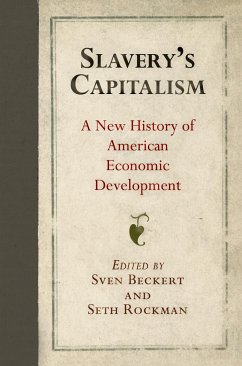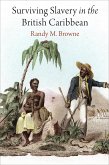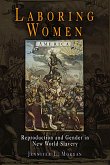Slavery's Capitalism
A New History of American Economic Development
Herausgeber: Beckert, Sven; Rockman, Seth
Slavery's Capitalism
A New History of American Economic Development
Herausgeber: Beckert, Sven; Rockman, Seth
- Broschiertes Buch
- Merkliste
- Auf die Merkliste
- Bewerten Bewerten
- Teilen
- Produkt teilen
- Produkterinnerung
- Produkterinnerung
Sven Beckert is Laird Bell Professor of History at Harvard University. Seth Rockman is Associate Professor of History at Brown University.
Andere Kunden interessierten sich auch für
![In Slavery's Wake In Slavery's Wake]() National Museum of African American History andIn Slavery's Wake46,99 €
National Museum of African American History andIn Slavery's Wake46,99 €![Colonial Complexions Colonial Complexions]() Sharon BlockColonial Complexions29,99 €
Sharon BlockColonial Complexions29,99 €![Dispossessed Lives Dispossessed Lives]() Marisa J. FuentesDispossessed Lives33,99 €
Marisa J. FuentesDispossessed Lives33,99 €![Surviving Slavery in the British Caribbean Surviving Slavery in the British Caribbean]() Randy M. BrowneSurviving Slavery in the British Caribbean33,99 €
Randy M. BrowneSurviving Slavery in the British Caribbean33,99 €![Wicked Flesh Wicked Flesh]() Jessica Marie JohnsonWicked Flesh29,99 €
Jessica Marie JohnsonWicked Flesh29,99 €![Laboring Women Laboring Women]() Jennifer L. MorganLaboring Women34,99 €
Jennifer L. MorganLaboring Women34,99 €![Wicked Flesh Wicked Flesh]() Jessica Marie JohnsonWicked Flesh40,99 €
Jessica Marie JohnsonWicked Flesh40,99 €-
-
-
Sven Beckert is Laird Bell Professor of History at Harvard University. Seth Rockman is Associate Professor of History at Brown University.
Hinweis: Dieser Artikel kann nur an eine deutsche Lieferadresse ausgeliefert werden.
Hinweis: Dieser Artikel kann nur an eine deutsche Lieferadresse ausgeliefert werden.
Produktdetails
- Produktdetails
- Early American Studies
- Verlag: University of Pennsylvania Press
- Seitenzahl: 416
- Erscheinungstermin: 6. Februar 2018
- Englisch
- Abmessung: 228mm x 152mm x 27mm
- Gewicht: 638g
- ISBN-13: 9780812224177
- ISBN-10: 0812224175
- Artikelnr.: 49961814
- Herstellerkennzeichnung
- Produktsicherheitsverantwortliche/r
- Europaallee 1
- 36244 Bad Hersfeld
- gpsr@libri.de
- Early American Studies
- Verlag: University of Pennsylvania Press
- Seitenzahl: 416
- Erscheinungstermin: 6. Februar 2018
- Englisch
- Abmessung: 228mm x 152mm x 27mm
- Gewicht: 638g
- ISBN-13: 9780812224177
- ISBN-10: 0812224175
- Artikelnr.: 49961814
- Herstellerkennzeichnung
- Produktsicherheitsverantwortliche/r
- Europaallee 1
- 36244 Bad Hersfeld
- gpsr@libri.de
Sven Beckert is Laird Bell Professor of History at Harvard University. Seth Rockman is Associate Professor of History at Brown University.
Introduction. Slavery's Capitalism
—Sven Beckert and Seth Rockman
PART I. PLANTATION TECHNOLOGIES
Chapter 1. Toward a Political Economy of Slave Labor: Hands,
Whipping-Machines, and Modern Power
—Edward E. Baptist
Chapter 2. Slavery's Scientific Management: Masters and Managers
—Caitlin Rosenthal
Chapter 3. An International Harvest: The Second Slavery, the
Virginia-Brazil Connection, and the Development of the McCormick Reaper
—Daniel B. Rood
PART II. SLAVERY AND FINANCE
Chapter 4. Neighbor-to-Neighbor Capitalism: Local Credit Networks and the
Mortgaging of Slaves
—Bonnie Martin
Chapter 5. The Contours of Cotton Capitalism: Speculation, Slavery, and
Economic Panic in Mississippi, 1832-1841
—Joshua D. Rothman
Chapter 6. "Broad is de Road dat Leads ter Death": Human Capital and
Enslaved Mortality
—Daina Ramey Berry
Chapter 7. August Belmont and the World the Slaves Made—Kathryn Boodry
PART III. NETWORKS OF INTEREST AND THE NORTH
Chapter 8. "What have we to do with slavery?" New Englanders and the Slave
Economies of the West Indies
—Eric Kimball
Chapter 9. "No country but their counting-houses": The U.S.-Cuba-Baltic
Circuit, 1809-1812
—Stephen Chambers
Chapter 10. The Coastwise Slave Trade and a Mercantile Community of
Interest
—Calvin Schermerhorn
PART IV. NATIONAL INSTITUTIONS AND NATURAL BOUNDARIES
Chapter 11. War and Priests: Catholic Colleges and Slavery in the Age of
Revolution
—Craig Steven Wilder
Chapter 12. Capitalism, Slavery, and the New Epoch: Mathew Carey's 1819
—Andrew Shankman
Chapter 13. The Market, Utility, and Slavery in Southern Legal Thought
—Alfred L. Brophy
Chapter 14. Why Did Northerners Oppose the Expansion of Slavery? Economic
Development and Education in the Limestone South
—John Majewski
Notes
Contributors
Index
Acknowledgments
—Sven Beckert and Seth Rockman
PART I. PLANTATION TECHNOLOGIES
Chapter 1. Toward a Political Economy of Slave Labor: Hands,
Whipping-Machines, and Modern Power
—Edward E. Baptist
Chapter 2. Slavery's Scientific Management: Masters and Managers
—Caitlin Rosenthal
Chapter 3. An International Harvest: The Second Slavery, the
Virginia-Brazil Connection, and the Development of the McCormick Reaper
—Daniel B. Rood
PART II. SLAVERY AND FINANCE
Chapter 4. Neighbor-to-Neighbor Capitalism: Local Credit Networks and the
Mortgaging of Slaves
—Bonnie Martin
Chapter 5. The Contours of Cotton Capitalism: Speculation, Slavery, and
Economic Panic in Mississippi, 1832-1841
—Joshua D. Rothman
Chapter 6. "Broad is de Road dat Leads ter Death": Human Capital and
Enslaved Mortality
—Daina Ramey Berry
Chapter 7. August Belmont and the World the Slaves Made—Kathryn Boodry
PART III. NETWORKS OF INTEREST AND THE NORTH
Chapter 8. "What have we to do with slavery?" New Englanders and the Slave
Economies of the West Indies
—Eric Kimball
Chapter 9. "No country but their counting-houses": The U.S.-Cuba-Baltic
Circuit, 1809-1812
—Stephen Chambers
Chapter 10. The Coastwise Slave Trade and a Mercantile Community of
Interest
—Calvin Schermerhorn
PART IV. NATIONAL INSTITUTIONS AND NATURAL BOUNDARIES
Chapter 11. War and Priests: Catholic Colleges and Slavery in the Age of
Revolution
—Craig Steven Wilder
Chapter 12. Capitalism, Slavery, and the New Epoch: Mathew Carey's 1819
—Andrew Shankman
Chapter 13. The Market, Utility, and Slavery in Southern Legal Thought
—Alfred L. Brophy
Chapter 14. Why Did Northerners Oppose the Expansion of Slavery? Economic
Development and Education in the Limestone South
—John Majewski
Notes
Contributors
Index
Acknowledgments
Introduction. Slavery's Capitalism
—Sven Beckert and Seth Rockman
PART I. PLANTATION TECHNOLOGIES
Chapter 1. Toward a Political Economy of Slave Labor: Hands,
Whipping-Machines, and Modern Power
—Edward E. Baptist
Chapter 2. Slavery's Scientific Management: Masters and Managers
—Caitlin Rosenthal
Chapter 3. An International Harvest: The Second Slavery, the
Virginia-Brazil Connection, and the Development of the McCormick Reaper
—Daniel B. Rood
PART II. SLAVERY AND FINANCE
Chapter 4. Neighbor-to-Neighbor Capitalism: Local Credit Networks and the
Mortgaging of Slaves
—Bonnie Martin
Chapter 5. The Contours of Cotton Capitalism: Speculation, Slavery, and
Economic Panic in Mississippi, 1832-1841
—Joshua D. Rothman
Chapter 6. "Broad is de Road dat Leads ter Death": Human Capital and
Enslaved Mortality
—Daina Ramey Berry
Chapter 7. August Belmont and the World the Slaves Made—Kathryn Boodry
PART III. NETWORKS OF INTEREST AND THE NORTH
Chapter 8. "What have we to do with slavery?" New Englanders and the Slave
Economies of the West Indies
—Eric Kimball
Chapter 9. "No country but their counting-houses": The U.S.-Cuba-Baltic
Circuit, 1809-1812
—Stephen Chambers
Chapter 10. The Coastwise Slave Trade and a Mercantile Community of
Interest
—Calvin Schermerhorn
PART IV. NATIONAL INSTITUTIONS AND NATURAL BOUNDARIES
Chapter 11. War and Priests: Catholic Colleges and Slavery in the Age of
Revolution
—Craig Steven Wilder
Chapter 12. Capitalism, Slavery, and the New Epoch: Mathew Carey's 1819
—Andrew Shankman
Chapter 13. The Market, Utility, and Slavery in Southern Legal Thought
—Alfred L. Brophy
Chapter 14. Why Did Northerners Oppose the Expansion of Slavery? Economic
Development and Education in the Limestone South
—John Majewski
Notes
Contributors
Index
Acknowledgments
—Sven Beckert and Seth Rockman
PART I. PLANTATION TECHNOLOGIES
Chapter 1. Toward a Political Economy of Slave Labor: Hands,
Whipping-Machines, and Modern Power
—Edward E. Baptist
Chapter 2. Slavery's Scientific Management: Masters and Managers
—Caitlin Rosenthal
Chapter 3. An International Harvest: The Second Slavery, the
Virginia-Brazil Connection, and the Development of the McCormick Reaper
—Daniel B. Rood
PART II. SLAVERY AND FINANCE
Chapter 4. Neighbor-to-Neighbor Capitalism: Local Credit Networks and the
Mortgaging of Slaves
—Bonnie Martin
Chapter 5. The Contours of Cotton Capitalism: Speculation, Slavery, and
Economic Panic in Mississippi, 1832-1841
—Joshua D. Rothman
Chapter 6. "Broad is de Road dat Leads ter Death": Human Capital and
Enslaved Mortality
—Daina Ramey Berry
Chapter 7. August Belmont and the World the Slaves Made—Kathryn Boodry
PART III. NETWORKS OF INTEREST AND THE NORTH
Chapter 8. "What have we to do with slavery?" New Englanders and the Slave
Economies of the West Indies
—Eric Kimball
Chapter 9. "No country but their counting-houses": The U.S.-Cuba-Baltic
Circuit, 1809-1812
—Stephen Chambers
Chapter 10. The Coastwise Slave Trade and a Mercantile Community of
Interest
—Calvin Schermerhorn
PART IV. NATIONAL INSTITUTIONS AND NATURAL BOUNDARIES
Chapter 11. War and Priests: Catholic Colleges and Slavery in the Age of
Revolution
—Craig Steven Wilder
Chapter 12. Capitalism, Slavery, and the New Epoch: Mathew Carey's 1819
—Andrew Shankman
Chapter 13. The Market, Utility, and Slavery in Southern Legal Thought
—Alfred L. Brophy
Chapter 14. Why Did Northerners Oppose the Expansion of Slavery? Economic
Development and Education in the Limestone South
—John Majewski
Notes
Contributors
Index
Acknowledgments








